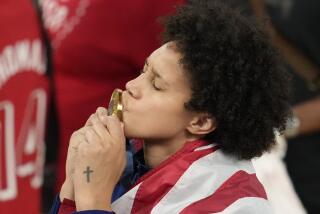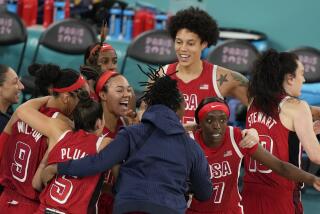Women’s gymnastics gold a teen dream for U.S.
LONDON — The five members of the U.S. women’s gymnastics team, Olympic rookies all, the oldest 18 and the youngest three months from her 16th birthday, performed like calm, seasoned athletes on a historic night at the London Games.
Glitter apparently empowered them, because beneath the brilliant sparkles on their red leotards beat the hearts of champions. With a singleness of purpose they won the team gold medal Tuesday by more than five points over the weeping and wobbly-kneed Russians, an astonishing gap at the international elite level.
Electrifying Gabrielle Douglas, vault wizard McKayla Maroney, consistently precise Aly Raisman, still-growing Kyla Ross and powerful Jordyn Wieber were emphatic in winning the second-ever Olympic title for the U.S. women’s team. The only previous winner was the 1996 “Magnificent Seven,” the darlings of the Atlanta Games, leaving this U.S. group the distinction of being the first to prevail without having home-country advantage.
PHOTOS: U.S. wins gold in women’s gymnastics
In a sport governed by judges who can be influenced by crowds, this victory was impressive. The U.S. women, who ranked first in the team qualifying phase Sunday, had the highest scores in three of the four events that made up Tuesday’s competition. They ranked first in vault, balance beam and floor exercise and third on the treacherous uneven bars to rack up 183.596 points, followed by Russia with 178.530 and Romania with 176.414.
Changes in the sport’s rules and format make it difficult to compare gymnasts or teams of different eras. But to Martha Karolyi, wife of the legendary coach Bela Karolyi and the coordinator of the U.S. women’s team since 2001, this group stands alone.
“I think this achievement is higher just because we are on foreign grounds, and usually it’s harder to do the result outside of the country,” said Martha Karolyi, who had hinted she might retire after the Olympics but said Tuesday she is energized enough at age 69 to continue for several years.
“This is one of the best teams that we ever had. The girls are very well-prepared physically and also mentally extremely tough. We had two days of competition without major mistakes. None of the girls had a fall in two days.”
The “Magnificent Seven” nickname can’t be revived because each team is now limited to five performers. What, then, should this quintet be called?
“I like ‘Fierce Five’ because we are definitely the fiercest team out there,” said Maroney, who was called upon Tuesday only to vault and delivered the highest-scoring leap of the competition, launching the team to a strong start.
“We’re all babies and this is our first Olympics and it’s great to prove that we could do this. I know there were a lot of rumors that it wouldn’t happen . . . but the whole time we knew that we could do it and I’m so happy that we did.”
Each girl contributed in her own way on Tuesday.
Wieber, who finished behind Douglas and Raisman in the qualifying round Sunday and was shut out of the all-around championship by a rule that limits each country to two entries, put aside her disappointment Tuesday. She produced solid efforts in the vault, uneven bars and floor exercise.
“I feel great,” said Wieber, of DeWitt, Mich. “I knew I had to redeem myself a little bit, but this was my ultimate goal.”
Maroney, of Long Beach, proved her value extended beyond her athletic abilities.
“After vault I was the cheerleader. I was the one to get them anything,” she said. “I was the one massaging Aly at one point, getting her ready for beam. I was like their little helper out there, so I loved watching them and I cheered for them the whole entire time and hopefully that helped a lot.”
They moved from vault to the uneven bars, then to the balance beam and finally to floor exercise, padding their lead with every leap and twist. They led China by less than two points after the first rotation, led Russia by .299 halfway through, extended that lead to just over a point after three rotations and pulled away when the Russians, who had faltered on balance beam, stumbled through the floor-exercise portion.
“Certainly the pressure was on,” Karolyi said of the Russians. “Those are the moments your stomach acts like cramped-up. I knew our girls did a good job and I saw the Russians being a tiny bit nervous. When the beam finished I had the feel that we definitely have a chance to have this medal.”
They didn’t just have it — they seized it. Bela Karolyi, coach of Romanian Olympic gold medalist Nadia Comaneci and so many other champions, said it had been a long time since he saw a team performance in which no one made a major mistake.
“There have been very, very few. I guarantee you,” he said. “I’ve seen it once or twice, back in the old days of the Soviet era.”
This is a new era, and the U.S. women are, for now, its queens.
“It’s the best feeling in the world,” said Raisman, who’s from Needham, Mass. “It’s a dream come true and I’m so excited. I can’t believe it.”
twitter.com/helenenothelen
More to Read
Go beyond the scoreboard
Get the latest on L.A.'s teams in the daily Sports Report newsletter.
You may occasionally receive promotional content from the Los Angeles Times.







